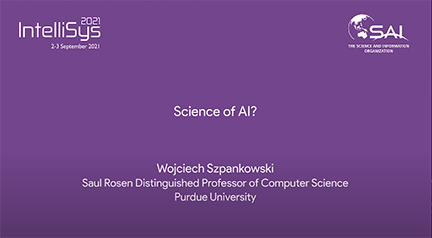CSoI Director, Wojciech Szpankowski, recently gave a keynote presentation for the IntelliSys 2021 conference titled: "Science of AI?"
Abstract:
AI systems have demonstrated immense potential for fundamentally reshaping virtually all technological processes and artifacts. What is perhaps less evident, but equally important, is the realization that current AI systems have fundamental limitations that are not well-understood, even in domains where their use is commonplace. In terms of performance, issues of bias, confidence, and introspection (assessing the performance of inference), are only now being investigated. In safety-critical domains such as autonomous systems, learning enabled systems must be verifiable and constrained by safety properties. In systems with `humans-in-the-loop', such as healthcare, inferences must be interpretable and explainable in terms of concepts accessible to human experts. In social science and government policy formal measures and guarantees of fairness are important. When relying on sensitive data, rigorous definitions and guarantees of privacy and suitable tradeoffs of privacy and accuracy of inference are paramount. These remain fundamental challenges -- solutions to which are essential for wide deployment of AI technologies. In this talk, after reviewing some challenges facing AI, we argue for the need of a holistic framework for Science of AI based on the following pillars: data, information, complexity, logic, and inference. Building on our work over the past decade at the NSF-sponsored Center for Science of Information (CSoI), we characterize information in different data abstractions and representations. We illustrate our thinking on a few examples. We start with temporal inference of evolution of the brain, based on structural information. Then, we move to AI in agriculture and discuss provenance in the food supply chain and use of provenance data in optimization, equitable distribution, and safety. Finally, we briefly discuss challenges in AI and quantum science. If time allows, we cover recent results on regret for logistic regression and muse on misinformation.
About the Speaker:
Wojciech Szpankowski is the Saul Rosen Distinguished Professor of Computer Science at Purdue University where he teaches and conducts research in analysis of algorithms, information theory, analytic combinatorics, random structures, and stability problems of distributed systems. He held several Visiting Professor/Scholar positions, including McGill University, INRIA, Stanford, Hewlett-Packard Labs, Universite de Versailles, University of Canterbury, New Zealand, Ecole Polytechnique, France, the Newton Institute, Cambridge, UK, ETH, Zurich, Hawaii University, and Gdansk University of Technology, Poland. He is a Fellow of IEEE, and the Erskine Fellow. In 2010 he received the Humboldt Research Award and in 2015 the Inaugural Arden L. Bement Jr. Award. In 2020 he was the recipient of the Flajolet Lecture Prize. He published two books: "Average Case Analysis of Algorithms on Sequences", John Wiley & Sons, 2001, and "Analytic Pattern Matching: From DNA to Twitter", Cambridge, 2015. In 2008 he launched the interdisciplinary Institute for Science of Information, and in 2010 he became the Director of the NSF Science and Technology Center for Science of Information.




